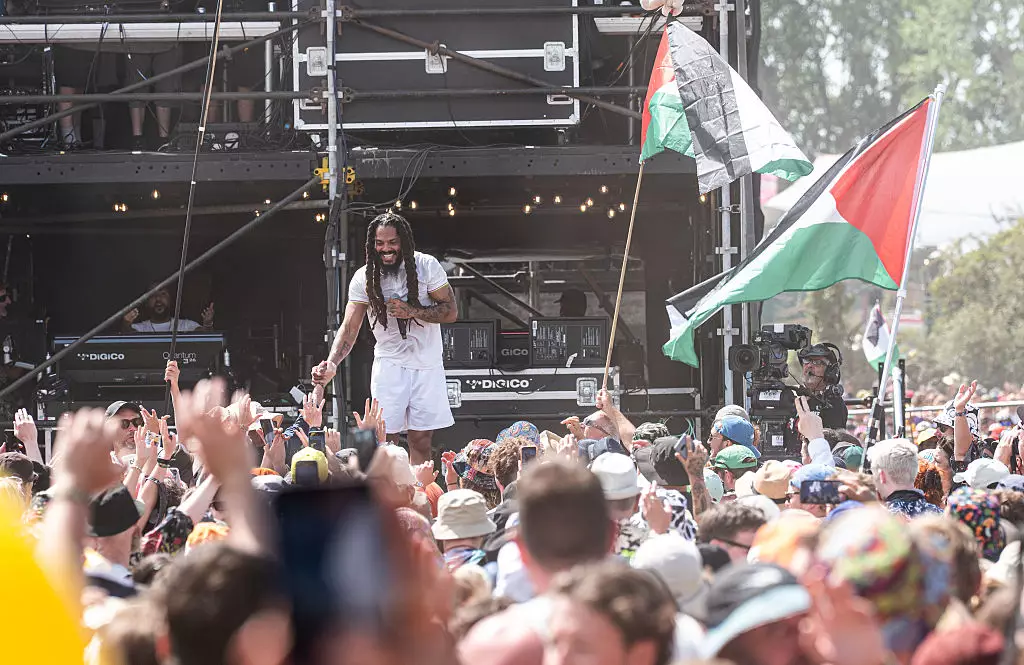In the world of music, performances are often reduced to mere entertainment, but when words are wielded deliberately, they can resonate far deeper, piercing through the haze of indifference. Bob Vylan, an English punk duo, recently demonstrated how a live set at Glastonbury could transcend mere music and morph into a rallying cry for political activism. With their recent performance, they managed to provoke not only fervent applause from many fans but also an immediate backlash from media and governmental figures. It highlights how artists can utilize their platforms to amplify urgent social messages, reflecting their commitment to advocacy while challenging the status quo.
A Performance that Shook the Crowd
During their electrifying set, Bob Vylan rallied thousands of concert-goers to chant powerful slogans in support of Palestinian liberation, such as “Death, Death To The IDF” and “Free, Free Palestine.” The scene was visually striking, peppered with Palestinian flags waving in the crowd. Such a powerful display created an atmosphere resonant with both solidarity and urgency. It wasn’t just a concert; it transformed into a space of activism, where the chorus of voices symbolized a powerful chorus of protest against the ongoing humanitarian crisis in Gaza.
Their declaration that “the United Nations has called it a genocide” starkly juxtaposed with the BBC’s more sanitized term of “conflict”. This deliberate reframing serves to not only polarize perceptions but also illuminate the stark realities faced by countless individuals in Palestine. When artists like Bob Vylan spotlight this disparity, they force the audience to confront uncomfortable truths.
The BBC’s Controversial Response
Perhaps predictably, the BBC deemed the band’s comments during the performance as “deeply offensive,” leading to their decision not to make the set available on demand, effectively attempting to silence the dissent expressed through music. This action reveals a troubling narrative in mainstream media—the inclination to sanitize controversial political discourse in favor of palatable reporting. The tension between artistic expression and media censorship played out publicly, raising questions about who controls the narrative and who gets to voice dissent.
By issuing a warning during the live stream regarding the “strong and discriminatory language,” the BBC inadvertently legitimized the message while attempting to distance itself from the sentiments expressed. Music has long served as a conduit for protest, and in their endeavors to curb controversial expressions, media outlets may unintentionally fortify the very sentiments they seek to suppress.
The Divisive Nature of Politics in Music
The aftermath of Bob Vylan’s performance underscored the deeply polarized political landscape in the United Kingdom. While some hailed the band as brave champions of free speech and advocates for social justice, others—including members of the government—harshly criticized them. Conservative figures reacted with outrage, deriding the performance as inappropriate and inflammatory. This leads us to a concerning reality: the division between freedom of expression and national sentiment is more pronounced than ever.
Complicating matters further was the performance of Irish band Kneecap, who made headlines themselves by leading the crowd in chants of “Fuck Keir Starmer.” Their similar themes of protest echoed through the festival, yet their context felt even more charged given the backdrop of recent legal challenges faced by their band member, Mo Chara. The ensuing discussions about political content in music engender a wider conversation about what it means to engage with art in a time of crisis.
The Human Cost Behind the Headlines
Amidst the controversy, it is essential to remember the chilling context that propelled Bob Vylan onto that stage. As reports indicate over 58,000 deaths in the ongoing conflict, with the vast majority being civilians, the urgency of their message cannot be overstated. The lyrics invoked by the band didn’t just represent a political stance; they were rooted in human suffering.
Leading on from this question of artistic responsibility, it becomes apparent that musicians navigating such treacherous territories challenge audiences to confront realities that mainstream narratives nominally overlook. The power of political music, as demonstrated by Bob Vylan and their peers, is not just an opportunity for expression but a clarion call for action—a visceral invitation to participate in the discourse surrounding pressing global issues.
As we reflect on these compelling performances, it becomes increasingly clear that the intersection of activism and art represents a vital arena for cultural discourse, capable of igniting movements and inspiring profound change.
